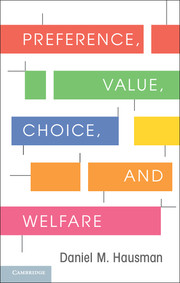Book contents
- Frontmatter
- Contents
- Figures
- Preface
- 1 Preferences, Comparative Evaluations, and Reasons
- Part I Preferences in Positive Economics
- Part II Preferences, Welfare, and Normative Economics
- Part III Psychology, Rational Evaluation, and Preference Formation
- 9 The Psychology of Choice
- 10 Constructing Preferences
- 11 Conclusions
- References
- Index
10 - Constructing Preferences
from Part III - Psychology, Rational Evaluation, and Preference Formation
Published online by Cambridge University Press: 05 June 2012
- Frontmatter
- Contents
- Figures
- Preface
- 1 Preferences, Comparative Evaluations, and Reasons
- Part I Preferences in Positive Economics
- Part II Preferences, Welfare, and Normative Economics
- Part III Psychology, Rational Evaluation, and Preference Formation
- 9 The Psychology of Choice
- 10 Constructing Preferences
- 11 Conclusions
- References
- Index
Summary
Chapter 10 aims to reinforce two conclusions: that preferences, like judgments, are subject to rational scrutiny – that they are not just matters of taste – and that economists need to model preference formation. In doing this, it assembles elements out of which economists can construct models of preference formation. If preferences were complete and settled before economists go to work, it would not matter how preferences are formed. But if economists took preferences among the immediate objects of choice to be givens, they would have little to say about behavior, other than that people choose what they prefer. In addition, as we saw in the last chapter, people’s preferences often depend on features of the choice situation, and economists need to understand how.
Preferences are the end of a complicated and largely untold story with a great deal of cognitive structure. It is hard to construct a total comparative evaluation. To do so, agents need to identify the alternatives and their properties and to weigh the considerations that count in favor of alternatives or against them. Agents must explore the causal pathways from actions to outcomes and determine the probabilities and the values of the consequences.
Information
- Type
- Chapter
- Information
- Preference, Value, Choice, and Welfare , pp. 117 - 132Publisher: Cambridge University PressPrint publication year: 2011
